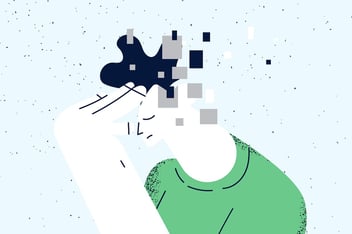
If you’ve ever found yourself whispering, ‘I surrender,’ take solace in the fact that you’re not alone. Life’s unpredictable twists and turns, persistent challenges, or the stark contrast between reality and your expectations can all conspire to make you feel like throwing in the towel.
During these trying times, it’s crucial to recognize that such feelings, as fleeting as they may be, should be taken seriously, both for your sake and the well-being of your loved ones. Wanting to relinquish hope in life can be a precursor to something far more dire, such as suicidal thoughts. This is why it’s imperative to reach out to a hotline, a healthcare professional, a social worker, a trusted clergy member, a compassionate teacher, a close friend, or a family member whenever these emotions surface. Your zest for life can be rekindled with the appropriate treatment and support.
Comprehending Suicidal Ideation
A common misconception about suicidal ideation is that it solely involves plotting one’s demise. Active suicidal ideation represents one facet but is not the sole dimension.
What Is Passive Suicidal Ideation?
Passive suicidal ideation, in contrast, denotes a yearning to escape life or relinquish it without necessarily formulating a concrete plan for suicide. It’s vital to treat passive suicidal ideation seriously, as those who have lost their will to live may gradually transition into actively contemplating suicide and devising a plan to end their lives rather than simply hoping for an accidental demise or never awakening.
Indicators of suicidal thoughts include various behaviors:
- Obsessing over death or dying
- Giving away possessions
- Discussing suicide or expressing regret about one’s existence
- Feelings of profound hopelessness
- Bid farewells to loved ones
- Acquiring weapons, medication, or other means to facilitate self-harm
- Isolating oneself from social interactions
- Mood swings and notable personality shifts
- Alterations in daily routines
- Arranging personal affairs without apparent cause
Disorders Linked to Suicidal Thoughts
Numerous mental health disorders can elicit feelings of surrendering to life’s challenges. Suicidal ideation is frequently associated with mood disorders such as:
- Anxiety disorders: Research indicates that individuals with anxiety disorders are more prone to experiencing suicidal thoughts, behaviors, attempts, or even completed suicide. The prevalence varies depending on the specific type of anxiety disorder. For instance, 23% of individuals with panic disorder have suicidal ideation.
- Bipolar disorder: This condition induces extreme mood swings and is connected to a significantly heightened risk of suicide, ranging from 10 to 30 times higher than the general population.
- Major depressive disorder: Depression is a significant suicide risk factor, with approximately 56% of those with depression experiencing suicidal ideation at some point in their lives.
- Persistent depressive disorder (also known as dysthymia): People with dysthymia face a lifetime risk of suicide at around 14.3%, somewhat higher than the general population.
Additionally, suicidal ideation can be linked to:
- Personality disorders, notably borderline personality disorder
- Hormonal imbalances include postpartum depression, perimenopause, and premenstrual dysphoric disorder.
- Post-traumatic stress disorder (PTSD)
Other Contributing Factors
Intending to surrender is not exclusively tied to diagnosed mental health conditions or hormonal shifts. Life circumstances can exert immense pressure, leading one to lose the desire to persist.
The experience of grief and the pain of losing a beloved person can lead to a deep and overwhelming sense of hopelessness. Survivors may grapple with continuing in a world without their cherished friends or family members.
Relationship breakdowns or divorces can also plunge individuals into despair, making life seem unbearable. Job loss, especially when one’s identity is closely entwined with one’s occupation, can similarly erode one’s will to live.
Situational Depression
Individuals who passively contemplate suicide due to significant life changes may grapple with situational depression. Although not officially recognized as a distinct disorder, mental health professionals may employ this term to describe patients struggling to adjust to significant life upheavals. They might diagnose such patients with an adjustment disorder featuring depressive symptoms.
Chronic Challenges, Burnout, and Lingering Trauma
Sometimes, people wishing to surrender haven’t necessarily weathered dramatic life shifts but have become worn down by persistent issues, burnout, or unresolved trauma.
Chronic Problems
Individuals grappling with chronic health conditions may reach a point where they no longer wish to confront life through the lens of their ailment. Research has demonstrated that severe diagnoses, such as cancer, heart disease, and degenerative neurological conditions, correlate with an elevated risk of suicide.
Various life events can trigger suicidal thoughts:
- The aftermath of a breakup can induce not just depression related to the separation but also despair about a series of failed relationships, creating a sense of hopelessness regarding prospects.
- Trapping in a dead-end relationship or job can instill the belief that life is not fulfilled. Reporting to a position where one feels consistently undervalued, underpaid, overlooked, or unchallenged can be deeply disheartening.
- Remaining in a strained marriage due to obligations like children or religion can similarly sap the vibrancy from life.
Burnout
Burnout is another factor that can give rise to suicidal ideation. While it’s commonly associated with workplace stress, additional life pressures can exacerbate it.
Many parents, for instance, navigate a grueling “second shift” upon returning home from work, involving cooking, cleaning, and tending to their children’s needs, often with minimal assistance from their partner.
High-pressure professions, such as medicine, also breed burnout. Prolonged work hours and insufficient sleep can drive certain individuals to turn to drugs or alcohol as coping mechanisms for managing stress. During the COVID-19 pandemic, several healthcare providers tragically took their own lives as they grappled with overwhelming patient mortality and a scarcity of resources.
Unresolved Trauma
Unresolved childhood trauma can likewise sow the seeds of a desire to surrender. Individuals who endured prolonged abuse during their formative years and now have complex PTSD (C-PTSD) may grapple with flashbacks, nightmares, difficulties in trusting others, and the belief that the world is inherently unsafe.
These individuals may lose faith in religion, further intensifying feelings of isolation as they strive to recover from the wounds of their past. The impact of childhood trauma is particularly profound, as it can shape one’s perception of the world.
A meta-analysis uncovered that adults who suffered physical, sexual, or emotional abuse during their childhood had a two to three times higher likelihood of encountering suicidal thoughts in their adult years.
Seeking Assistance When You Feel Like Giving Up on Life
When you reach a point where you no longer wish to continue, it’s crucial to schedule an appointment with a healthcare provider, especially a licensed mental health expert, to discuss your feelings.
Conclusion:
There are moments when we may whisper, ‘I surrender,’ as the weight of our experiences and emotions becomes overwhelming. It’s essential to remember that these moments are not unique to us; they are part of the human experience. However, when we find ourselves in this dark place, we must seek help and support for ourselves and those who care about us.
Suicidal ideation, whether active or passive, should never be taken lightly. It indicates profound distress, and reaching out for assistance is a testament to strength, not weakness. Friends, family members, healthcare professionals, and therapists are here to lend an understanding ear and a helping hand.
Moreover, it’s essential to recognize that various factors can contribute to these feelings, from mental health conditions to life circumstances. Understanding the root causes is crucial in finding effective treatment and recovery strategies.
Whether through psychotherapy, medication, or other forms of support, there are paths to rediscover hope and a renewed will to live. Every individual’s journey is unique; the right approach will depend on your circumstances and needs.
In those darkest moments when you feel like giving up, remember that there is hope, and people want to help you find it. You don’t have to face these challenges alone; a brighter tomorrow awaits you.




